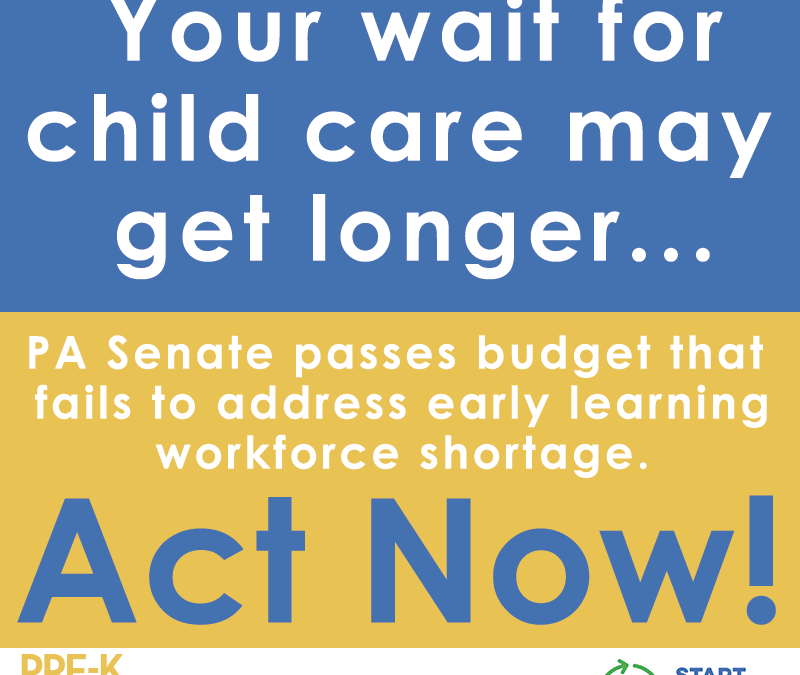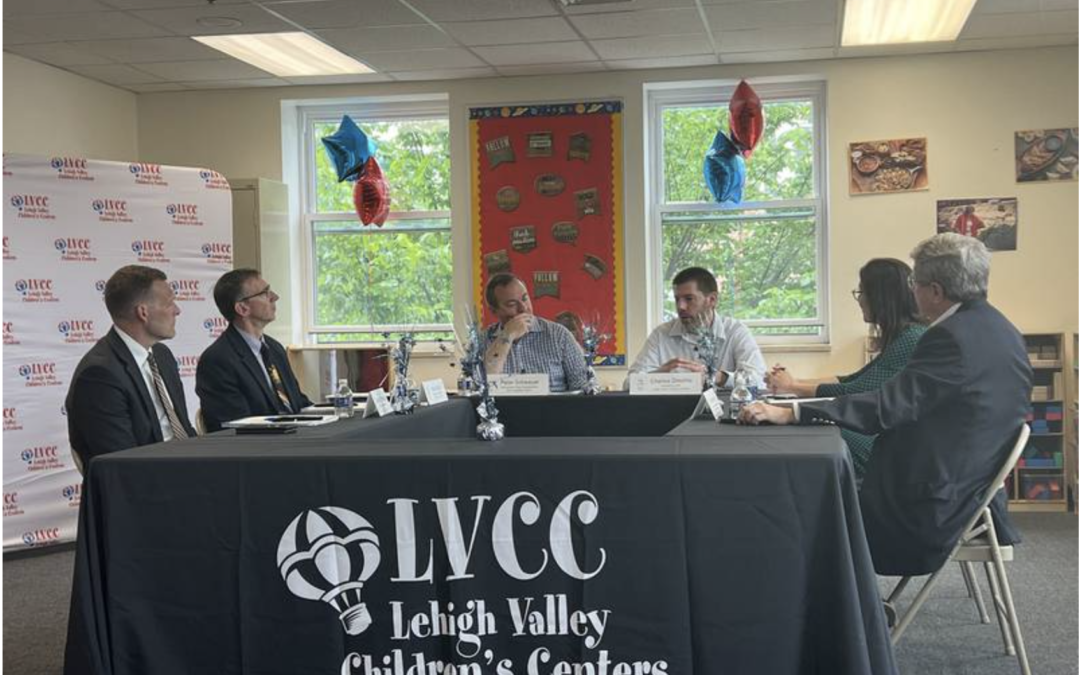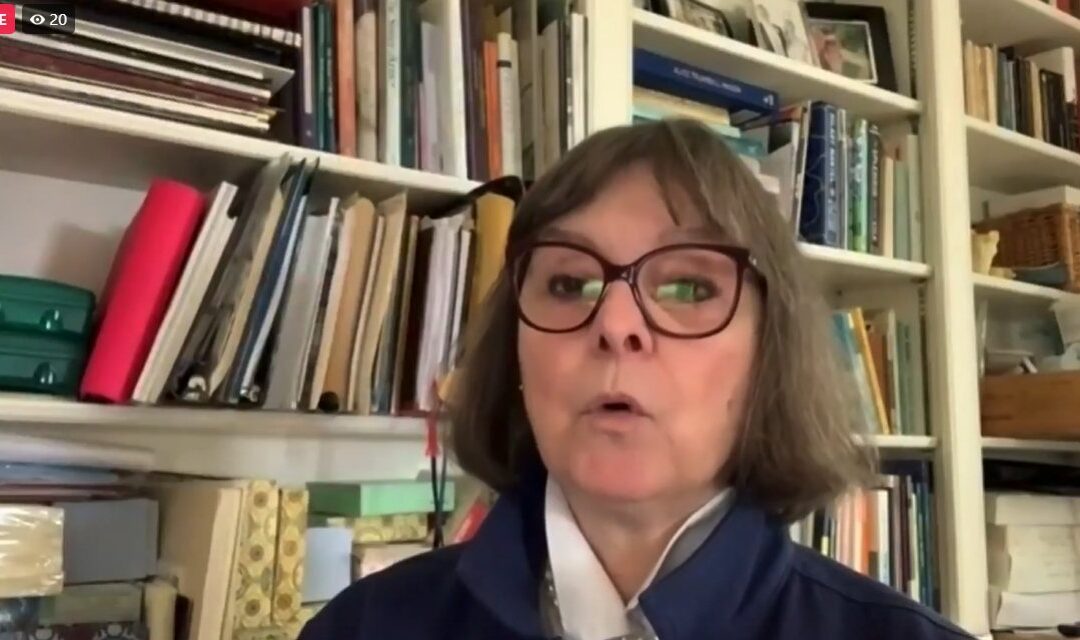
Surveys Find Devastating Impacts of State Budget Impasse on Pennsylvania’s Early Learning Providers
Documented to date: $20 Million in Loans; 4,000 Children Shut Out
Harrisburg, PA (October 17, 2025) – Recent surveys conducted by the Pre-K for PA and Start Strong PA campaigns as well as the Pennsylvania Office of Childhood Development and Early Learning (OCDEL) of both Pre-K Counts and Head Start Supplemental Assistance Program (HSSAP) providers found widespread, devastating impacts resulting from the state budget impasse.
In response to a short survey concluded on October 10th, Pre-K for PA / Start Strong PA documented that 95 Pre-K Counts and HSSAP providers across 32 counties have collectively taken on nearly $20 million in loans in order to continue to serve working families while state funding has been frozen. Many of these loans have been business lines of credit taken out at an average interest rate of 7.5 percent, while others have been personal loans with higher interest rates. Many providers have indicated that loans will only sustain operations for a short period of time and the accumulated interest liability may have severe consequences for future operations.
“This survey represents just a small portion of early learning providers, but it is clear that the continued state budget impasse is further destabilizing a sector that was already in the midst of a crisis with financial and staffing challenges,” said Kara McFalls, Executive Director of the Pennsylvania Head Start Association. “Early learning providers can not withstand additional insecurity.”
While dozens of providers have taken on debt to keep their classrooms open, many others have been forced to take even more drastic measures, including laying off staff and closing classrooms completely.
Through targeted outreach across 21 grantees operating Pre-K Counts and/or HSSAP programs across 16 PA Counties, OCDEL documented closures, planned closures, or delayed openings of classrooms that affect more than 4,000 slots across the Commonwealth. This represents more than 4,000 children being denied the opportunity of a foundational early learning experience due to the inability to pass a timely PA state budget. It also represents working families across the state that are struggling to arrange and pay for alternate care for their children during working hours. Both Pre-K Counts and HSSAP are free programs for qualifying families.
“We know that gaps in care already cost this Commonwealth over $6.5 Billion in lost economic opportunity each year. This impasse and its effects on working families and early learning providers is adding to this figure,” said Robert S. Carl, Jr., President and CEO of the Schuylkill Chamber of Commerce. “Additionally, shutting our youngest learners out of classrooms will certainly have negative impacts on school readiness for this cohort of three- and four-year-olds in years to come. It’s time to compromise and pass a budget that invests in the early learning workforce!”
Previous surveys have documented thousands of unfilled early learning teaching positions due to low pay. Providers fear that closures and layoffs resulting from the current state budget impasse will significantly exacerbate these staffing challenges and further destabilize programs for the foreseeable future.
Recent polling from March 2025 shows that Pennsylvania voters overwhelmingly support increasing state funding for early learning programs:
- 83% support allocating state funding to increase childcare worker wages.
- 73% support increasing state funding to serve more eligible children in pre-K programs.
- 73% support increasing state funding to help more low-income families afford high-quality childcare.
- 72% favor allocating state funding to increase compensation for pre-K teachers.
Pre-K for PA and Start Strong PA urge Pennsylvania policymakers to take this voter sentiment to heart and pass a final budget which includes:
- A $55 million investment in a new and recurring Child Care Recruitment and Retention line item to grant licensed child care providers participating in the child care subsidy program with $1,000 per educator;
- $17 million in additional funding for Pre-K Counts;
- $9.5 million for the Head Start Supplemental Assistance Program and
- $16.2 million increase for infant/toddler Early Intervention and $38.1 million increase for preschool Early Intervention.
“These urgently needed investments will stabilize and reverse the exodus of early educators and help keep early learning programs open so parents can go to work,” said Jen DeBell, Executive Director of the Pennsylvania Association for the Education of Young Children. “It’s imperative that lawmakers return to Harrisburg and negotiate and pass a final budget that includes these pro-working family investments.”
###

FOR IMMEDIATE RELEASE:
Kate Philips (Pre-K for PA)
philips@parkerphilips.com
215-850-4647
Jodi Askins (Start Strong PA)
jodiaskins@gmail.com
272-444-1860
PA Senate Passes Budget with NO Funding to Address Early Learning Workforce Shortage
Child care / pre-k waitlists expected to get even longer
HARRISBURG, PA (June 30, 2023) — Today the Pennsylvania Senate passed its version of the state budget that fails to address the historic early learning workforce shortage. No new money was included for PA Pre-K Counts, Head Start Supplemental Assistance Program or efforts to stabilize the child care workforce. This means early learning providers will continue to lose teachers and close classrooms jeopardizing families’ ability to work.
For families with young children, access to child care and pre-k is a critical factor in their ability to go to work and ensure their children are in a safe and nurturing environment. Nearly 70 percent of all households with children younger than age 6 have all available caregivers in the workforce—that’s over 537,000 households.
For all other business sectors, the early learning sector is the workforce behind the workforce. When families can’t get child care, their children suffer, their income drops and the state’s economy is shortchanged. In a time of severe labor shortages, and billions in state budget surplus, the Senate’s failure to ensure parents have access to child care is a tragic oversight.
For all Pennsylvanians, when businesses aren’t fully staffed or staff are unreliable due to lack of child care, they cannot produce goods or provide services, creating shortages and increasing prices. So whether one has young children or not, the labor shortage in the early care and education sector matters to all of us.
The statewide Pre-K for PA and Start Strong PA campaigns are calling on Governor Shapiro and the Pennsylvania House of Representatives to invest in the workforce behind the workforce by:
- Investing in Pre-K Counts
- Investing in the Head Start Supplemental Assistance Program
- Boost funding for the child care workforce by increasing the child care services line item
About Pre-K for PA
Pre-K for PA is an issue campaign supported by individuals and organizations across Pennsylvania who believe that investing in our children is the right choice and an urgent necessity. Our vision is that every 3-and 4-year-old in Pennsylvania will have access to high-quality pre-k. For more information www.prekforpa.org.
About Start Strong PA
Start Strong PA launched in 2019 to support healthy child development, working families, and the economy by increasing access to and affordability of high-quality child care programs for young children. Learn more at www.startstrongpa.org

By Jenny Roberts | May 27, 2022
Lehigh Valley officials and community leaders are calling for increased funding for early child care and pre-kindergarten education to address a worker shortage exacerbated by the pandemic.
Lehigh Valley Children’s Centers hosted a discussion Thursday at one of its Allentown locations in partnership with Pre-K for PA and Start Strong PA Campaigns to urge state policymakers to provide an additional $115 million in state and federal child care funding in the 2022-23 Pennsylvania budget. The money would increase the hourly wages of child care workers by $2. Right now, the average child care worker makes less than $11 an hour.
Gov. Tom Wolf’s proposed budget would keep child care services and assistance funding flat for the third year in a row.
Read full article here.

Pa. First Lady Frances Wolf, educators, discuss proposal for increased funding for Pre-K
By Zoë Read | April 20, 2022
Pennsylvania First Lady Frances Wolf moderated a virtual panel discussion with early childhood educators on Wednesday to discuss Gov. Tom Wolf’s early childhood education spending plan. Wolf’s budget proposal includes $1.55 billion in basic education funding.
The plan calls for a $60 million increase in Pre-K Counts, a program that provides free half day or full day Pre-K for kids from households earning lower incomes, and kids with disabilities. Wolf’s office said that would allow 2,300 additional children to attend preschool. Wolf also proposed a $10 million increase for the Head Start Supplemental Assistance Program.
“We know that children who participate in high quality Pre-K programs perform better in school, and they are more likely to graduate and to earn more throughout their lives afterwards,” Frances Wolf said during Wednesday’s virtual event.
During the panel discussion, Robin Rohrbaugh, CEO of Community Progress Council in York, spoke of the importance of expanding access to early childhood education.

Gov. Wolf applauds state investment but warns more than cash is needed for early learning
October 12, 2021
An additional $30 million in state funding for early childhood education in 2021-22 will provide early learning programs for an additional 3,200 Pennsylvania children this school year.
But the investment isn’t all that is needed to ensure that children from six weeks to kindergarten age have the opportunity for quality education and care, Gov. Tom Wolf said Tuesday.
Wolf joined local early education advocates, educators and elected officials at the Gilson Child Development Center on Payne Avenue in Erie to celebrate the increased funding and warn that more needs to be done to provide a solid foundation for later learning.
“It’s not all that we need,” Wolf said. “There’s also a need to figure out how to make this system work better. We need to reinvent and drastically transform this industry. It’s that important.
“We also need to pay our teachers more, tens of thousands of dollars more, in the professional range,” Wolf said, commensurate with the important work that they do.
Read full article here.









